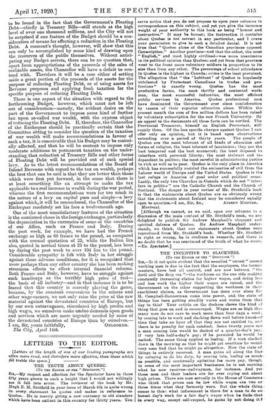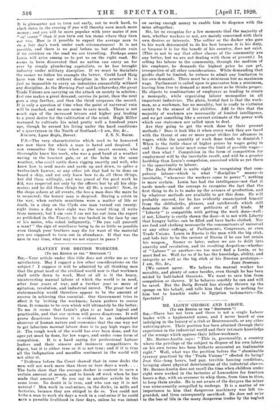THE INCENTIVE TO SLACKNESS.
[To THE EDITOR or THE " SPECTATOR.") SIR,—Is it not quite evident that the so-called " unrest" among working men is due to the fact that the employers, the former masters, have lost all control, and are now between " the devil and. the deep sea. "—the workmen on the one side making constantly increasing claims for higher wages, and doing less and less work the higher their wages are raised,. and the Government on the other supporting the workmen in their exorbitant claims, as Government has done ever since Sir H.. Campbell-Bannerman came into power, and the. state of things has been getting steadily worse and worse from that day to this? Your article on the dockers shows the kind cf thing that goes on and is encouraged. Wages are so high that many men do not care to work more than four days a week; by coming late to work and slacking down well before knook-off time they take an hour off that they are not entitled to, and there is no penalty for such conduct. Some twenty years ago a., man coming late would be docked of a quarter-day's pay, if very late half-a-day's pay; if he persisted he would be sacked. The same thing applied to loafing. If a man slacked down in the morning so that he might get overtime he would . very -soon 'find- that he might go altogether. Now the state of things is- entirely reversed. A man gains all along the line, by refusing to do his duty, by coming late, loafing as much,' as possible, and continually agitating for more pay, though in some of, the most important businesses he is not earning., what he now reoeivee—railwaymen, for instance. And yet these men and their leaders are. for ever crying out about high prices. There are men actually in the House of Commons who think that prices can be low while wages are two, or three times what they formerly were. But the-whole thing comes to this: what inducement is there- for a maa to do an honest day's work for a fair day's wages when he tilde-Mutt in every way, except self-respect, he gains . by not doing; it/ It is pleasanter not to turn out early, not to work hard, to clack down in the evening if you will thereby earn much more money; and you will be more popular with your mates if you " ea' canny " than if you turn out ten items where they turn out two. How is it possible to expect the average man to do a fair day's work under such circumstances? It is not possible, and there is no goal before us but absolute ruin if we continue on the read we are travelling. Perhaps some Lenin will arise among us to put us on the right road. -He seems to have discovered that no nation can carry on for ever by simply plundering capitalists, so he has brought industry under military discipline. If we must be Socialists the sooner we follow his example the better. Could Lord Haig have won the war without discipline in his armies? -It is just as impossible to carry on industries successfully without any discipline. As the Morning Post said lastSaturday,the great Trade Unions are carrying on the attack on society in echelon; first one makes a great demand, carries its point, then the next goes a step further, and then the third surpasses the second. It is only a question of time when the point of universal ruin will be reached, and no one seems to care much. There is not much sign of the increased leisure and higher pay leading to a great desire for the cultivation of the mind. Hugh Miller managed to cultivate his mind pretty well a hundred years ago, though he earned his living under the hard conditions of a quarryman in the North of Scotland.—I am, Sir,
P.S.—The very characteristics which used to be honoured are now those for which a man is hated and despised. I can remember the time when a good smart seaman, who thoroughly knew his work, who was a good hand at a weather taring in the heaviest gale, or at the helm in the same weather, who could rattle down rigging smartly and well, who knew how to send masts and yards up and down, to splice a twelve-inch hawser, or any other job that had to be done on 'board a ship, and not only knew how to do all these things, but did them willingly, and was proud of the good work he did, was respected not only by the officers but by all his ship- mates; and he did these things for £2 10s. a month ! Now, in the shops ashore at all events, the less a man does the more he is respected; the honest man is despised. During a crisis in the war, when certain munitions were a matter of life or death, in a shop on the Clyde one man turned out twenty- eight items a day when eight was the usual thing (I write from memory, but I am sure I am not far out from the report as published in the Times); he was bashed in the face by one of his mates, who asked indignantly, " Do you call yourself a man? " the sign of manliness being to do as little as possible even though your brothers may die for want of the material you are supposed to turn out in abundance. If that was the case in war time, what may we not expect in peace ?



































 Previous page
Previous page